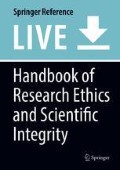Abstract
While it can be argued that the values, principles, and standards that underpin ethical research must apply to all disciplines and professions that conduct research, it remains the case that most, if not all, still seek to devise and apply distinctive ethical codes and/or guidelines that they perceive as specific to their own, specialized field. While highly generalized overarching principles can be accepted, their generality may be regarded as so vague they are impossible to disagree with. Moreover they fail to assist researchers within the specialist professional domain with practical solutions to the ethical issues they may have to confront in their everyday practice. Such an approach could be regarded as a restrictive practice and domain protectionism – but there are also clear practical advantages in a discipline being able to manage its own professional practices and rarely is it the case that generic codes provide some form of “off-the-shelf” solution to an ethical problem within the discipline’s domain. This chapter addresses issues that form the backcloth to the concerns raised by the authors in this section of the handbook.
References
de Winter JCF, Dodou D (2017) Human subjects research for engineers: a practical guide. Springer, Cham
Dench S, Iphofen R, Huws U (2004) An EU code of ethics for socio-economic research. Institute for Employment Studies (IES). Report 412. Brighton. Retrieved from www.respectproject.org
Editorial (2012) Times Higher Education, 1 March 2012, p 12
Geoghegan P (2012) If trust is lost, future promises naught but troubles for research. Times Higher Education, 19 January, p 28
Holloway I, Wheeler S (2002) Qualitative research in nursing, 2nd edn. Blackwell, Oxford
Iphofen R (ed) (2017) Finding common ground: consensus in research ethics across the social sciences. Advances in research ethics and integrity, vol 1. Emerald Publishing Limited, Bingley
Munro N, Dingwall R (2009) Ethical regulation: a challenge to artistic innovation? A-N Magazine, September, pp 5–6
Author information
Authors and Affiliations
Corresponding author
Editor information
Editors and Affiliations
Rights and permissions
Copyright information
© 2020 Springer Nature Switzerland AG
About this entry
Cite this entry
Iphofen, R. (2020). Ethics and Integrity in Research: Disciplines and Professions. In: Iphofen, R. (eds) Handbook of Research Ethics and Scientific Integrity. Springer, Cham. https://doi.org/10.1007/978-3-319-76040-7_56-1
Download citation
DOI: https://doi.org/10.1007/978-3-319-76040-7_56-1
Received:
Accepted:
Published:
Publisher Name: Springer, Cham
Print ISBN: 978-3-319-76040-7
Online ISBN: 978-3-319-76040-7
eBook Packages: Springer Reference Religion and PhilosophyReference Module Humanities and Social SciencesReference Module Humanities

